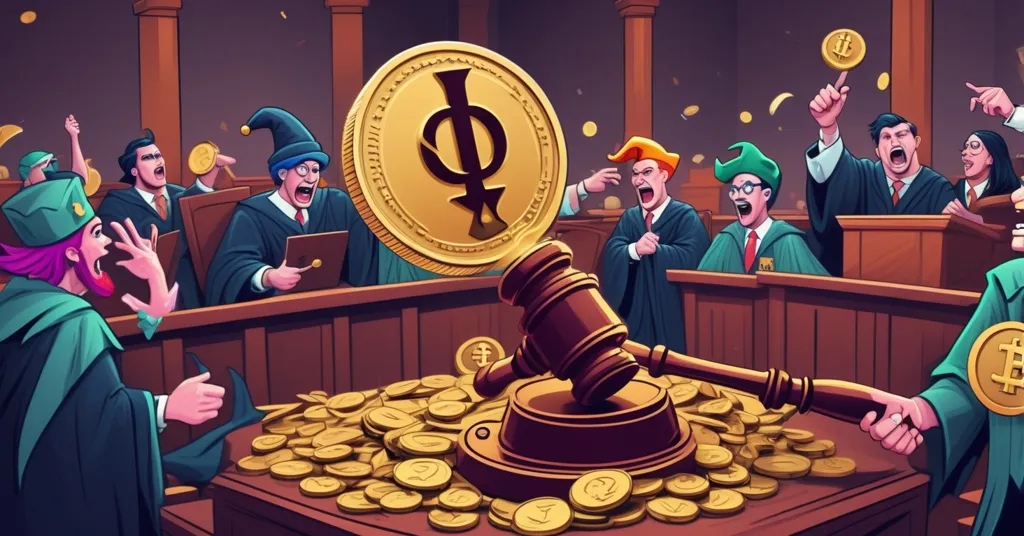Hayden Davis Rebrands LIBRA as Memecoin to Dodge $250M Lawsuit in Bold Move

Hayden Davis Rebrands LIBRA Token as Memecoin in Bold Defense Against $250M Lawsuit
Hayden Davis, the mind behind the once-buzzing LIBRA token, has pulled a jaw-dropping move by rebranding the project as a memecoin in a recent court filing. This audacious defense tactic comes amid a high-stakes class-action lawsuit in the Southern District of New York, with $250 million in frozen assets on the line and the potential to reshape how accountability is enforced in the chaotic crypto frontier.
- LIBRA’s Rollercoaster: Token soared to $5 in February 2025 with Argentine President Javier Milei’s backing, then crashed to near zero.
- Legal Firestorm: Davis, alongside associates from Meteora and Kip Protocol, faces fraud allegations in a $250M lawsuit.
- Memecoin Pivot: Reclassifying LIBRA as a speculative memecoin, Davis denies making any promises to investors.
LIBRA’s Meteoric Rise and Brutal Fall
Back in February 2025, LIBRA burst onto the crypto scene with a splash, rocketing to a peak of $5 per token in mere days. The catalyst? A glowing endorsement from Argentine President Javier Milei, a self-proclaimed libertarian and crypto advocate, who hyped the project on social media on February 14. Billed initially as an investment fund for struggling Argentine companies, LIBRA seemed like a lifeline in a nation hammered by relentless inflation and a crumbling peso. For a moment, it captured the imagination of investors desperate for financial innovation. But the fairy tale unraveled fast. Within weeks, LIBRA’s value plummeted to near zero, leaving countless holders with empty wallets. Today, it stumbles along at a pitiful $0.01690, with a market cap of just $4.61 million—a stark reminder of how quickly hype can turn to dust in this space. For more background on this turbulent journey, check out the detailed court filing updates on Hayden Davis’s rebranding move.
Argentina’s economic woes provided the perfect backdrop for LIBRA’s allure. With inflation rates often exceeding 100% annually, citizens have long sought alternatives to a devaluing currency. Cryptocurrency, with its promise of decentralization, has been a beacon for many. But when a project like LIBRA tanks so spectacularly, it raises the question: was this a genuine attempt at innovation gone wrong, or a calculated grift from the start?
Legal Showdown: $250 Million on the Line
Now, the fallout has landed in court. US private investor Omar Hurlock, backed by Burwick Law, is leading a class-action lawsuit against Davis, Benjamin Chow of the Meteora platform, and Julian Peh of Kip Protocol. Filed in the Southern District of New York under Judge Jennifer L. Rochon, with a hearing slated for August 19, 2025, the suit pulls no punches. Hurlock and fellow plaintiffs accuse the trio of orchestrating a textbook pump-and-dump scheme—artificially inflating LIBRA’s value through hype and endorsements before cashing out as it collapsed. The stakes couldn’t be higher: $250 million in frozen assets tied to LIBRA’s profits hang in the balance. If redirected to investors, it could mark a rare win for justice in crypto; if released to the defendants, it’s a jackpot in a lawless digital dodge city. Dig deeper into the specifics of the LIBRA token lawsuit in New York.
The Southern District of New York isn’t new to crypto drama. Known for handling high-profile cases involving digital assets, its rulings often set benchmarks for how US law interprets decentralized finance (DeFi). A key issue here is whether Hurlock can prove direct harm—did he buy LIBRA straight from Davis or his associates, or through secondary markets? Securities law, which governs whether a financial product counts as an investment contract with enforceable promises, could come into play. If LIBRA is deemed a security, Davis’s team might face serious liability for fraud. This isn’t just a lawsuit; it’s a potential turning point for how the US cracks down on crypto scams.
Memecoin Maneuver: Genius or Garbage?
In a 30-page defense filing that’s raised more than a few eyebrows, Davis has slapped a new label on LIBRA: it’s a memecoin, plain and simple. For the uninitiated, memecoins are a quirky subset of cryptocurrency, often born from internet memes or viral trends—think Dogecoin, inspired by a Shiba Inu dog, or Shiba Inu itself, a spin-off that rode similar hype. They’re typically light on utility or real-world value, fueled instead by community buzz and speculative trading. Most fizzle out fast; data from CoinGecko shows over 80% of memecoins lose 90% of their value within six months. By rebranding LIBRA as one, Davis is essentially saying, “Hey, this was always a gamble. No promises, no plans, no foul.” Community reactions to this pivot can be explored on platforms like Reddit discussions about the LIBRA lawsuit.
As Davis argues in his filing:
“Defendants provided no plans, details, or infrastructure to potential purchasers of the memecoin, nor did they provide detailed disclosures or tokenomic distribution information regarding how the funds raised would be allocated to fulfill the [allegedly] promised economic initiatives.”
Tokenomics, by the way, refers to the economic model of a cryptocurrency—how tokens are created, distributed, and used within a project. Davis’s point is clear: there was no roadmap, no guarantees. But let’s call a spade a spade—rebranding as a memecoin after a $250 million lawsuit smells like a pirouette out of accountability. Early buzz painted LIBRA as a serious tool for Argentina’s recovery, not a joke asset. Is this pivot a clever legal dodge, or does it just dig the hole deeper? And here’s where Bitcoin shines: BTC’s value is rooted in hardcoded scarcity and decentralization, not fleeting memes or rebrands. LIBRA’s antics only underline why Bitcoin remains king.
Political Fallout: Milei’s Messy Role
Adding fuel to the fire is Javier Milei’s involvement. His initial endorsement on X gave LIBRA an air of legitimacy—after all, a sitting president backing a crypto project isn’t everyday news. But when the token tanked, Milei pulled a swift U-turn, distancing himself and greenlighting an investigation by Argentina’s anti-corruption office. Here’s the kicker: recent updates show he’s been cleared of ethics violations by the federal authority, which ruled his endorsement was a personal act, not tied to government resources. Still, a separate criminal probe into potential securities violations and market manipulation looms. Milei’s quick shift from crypto cheerleader to “I barely knew it” is peak political gymnastics—impressive, but hardly inspiring trust. For the latest on this, see the updates on Milei’s ethics clearance and ongoing investigations.
In Argentina, where crypto is both a lifeline and a lightning rod, this flip-flop matters. Milei’s libertarian streak and pro-Bitcoin rhetoric have made him a darling of the decentralization crowd, but dabbling in unvetted projects like LIBRA risks tainting that image. The ongoing criminal scrutiny, despite the ethics clearance, shows how murky the waters get when public figures endorse volatile assets. For locals already skeptical of authority, this could either harden distrust in crypto or push for tighter oversight. Either way, it’s a mess of Milei’s own making, as highlighted in reports on his controversial crypto endorsements in Argentina.
Industry Impact: A Wake-Up Call for Crypto
Zooming out, the LIBRA debacle is a microcosm of everything messy about cryptocurrency today. Memecoins, while sometimes a laugh and a quick buck for early birds, often burn latecomers when the hype dies. The lack of clear regulation—whether in Argentina’s chaotic, crypto-friendly environment or the US’s SEC-driven crackdowns—lets opportunists exploit gaps while genuine projects struggle for legitimacy. Judge Rochon’s ruling could set a critical precedent. If LIBRA is treated as a security under US law, it might force accountability on speculative tokens. If Davis wins with the memecoin defense, expect more scammers to hide behind that label. Could this case push agencies like the SEC to classify all memecoins as securities, choking off a wild but risky niche? For broader context on the controversy, refer to the overview of the LIBRA token scandal.
For Bitcoin maximalists, this is yet another “I told you so” moment. Bitcoin doesn’t bend to hype or rebrands; its strength lies in a proven, unchangeable protocol. Altcoins and memecoins like LIBRA may carve out spaces for speculation or cultural commentary, but they rarely match BTC’s resilience. That said, I’ll tip my hat to the broader blockchain ecosystem—Ethereum and other protocols drive experiments that Bitcoin doesn’t, from DeFi to tokenization. Even when they flop (or worse, scam), they teach us what decentralized tech might become. The trick is cutting through the noise to spot the real innovators, not the snake oil peddlers.
What’s Next for LIBRA and Crypto?
As we count down to the August 19, 2025, hearing, the LIBRA case stands as both a cautionary tale and a litmus test. Will the $250 million in frozen assets go to compensating burned investors, or will Davis and his crew walk away scot-free? Beyond the money, the bigger question looms: how will this shape the future of crypto oversight? A win for Hurlock could embolden regulators to clamp down harder, while a victory for Davis might open the floodgates for more “memecoin” excuses. One thing is certain—freedom in decentralized finance comes with a brutal dose of buyer beware. Bitcoin and blockchain tech still hold the power to upend the status quo, but only if we weed out the grifters and build on solid ground. Are we playing a rigged game, or is this the messy price of financial liberty? For insights into public opinion on Milei’s impact, explore discussions on how Milei’s endorsement affected LIBRA’s trajectory.
Key Questions and Takeaways
- What sparked LIBRA’s dramatic rise and fall in February 2025?
Javier Milei’s social media endorsement drove the token to $5, but with no real infrastructure or value, it crashed to near zero as speculation faded. - Why did Hayden Davis rebrand LIBRA as a memecoin?
It’s a legal strategy to frame LIBRA as a speculative asset with no promised returns, aiming to sidestep fraud allegations in the lawsuit. - What’s at stake with the $250 million in frozen assets?
The court’s ruling will decide if these funds compensate investors or return to Davis and associates, marking a pivotal moment for crypto justice. - How does Milei’s involvement affect trust in crypto projects?
His endorsement initially boosted LIBRA’s credibility, but his retreat and the ongoing criminal probe highlight the dangers of political backing in volatile markets. - What could this lawsuit mean for the future of memecoins?
A loss for Davis might impose stricter accountability on speculative tokens, while a win could encourage more projects to dodge liability with the “memecoin” excuse. - Could the LIBRA case reshape crypto regulation?
Absolutely—depending on the verdict, it might push regulators like the SEC to tighten rules on memecoins or treat them as securities, reshaping the DeFi landscape.



